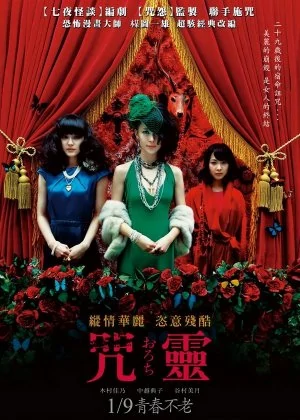Orochi

Tsuruta stood at the crib of the Japanese new wave of horror films. About 20 years later things have quieted down a little and the Japanese horror scene has grown more diverse once again. The black-haired ghosts have made room for films like Tamami and Grotesque and directors seem eager to explore new horror grounds. Combining all these elements it becomes obvious how Orochi was conceived.

Tsuruta is a horror veteran. Single-handedly pulling the Honto ni Atta Kowai series his influence of the Japanese new wave is beyond a doubt. With films like Yogen (remade as Premonition), Sky High (though more of a Kitamura film) and Dream Cruise (Master of Horror series) he reached beyond the realms of the Japanese public and landed some success in the West. I've seen most of his films, but can't say I am a big fan of his work. I'm not the biggest fan of the new wave in the first place, but even then his films seemed a big lacking compared to Shimizu and Nakata's efforts.
Orochi is an adaptation of a Kazuo Umezu manga, a rather strange public figure that left a legacy of interesting horror works behind. In recent years his work has proven a good source for film adaptations, leading to a series of 6 short films based on his stories. An interesting series if you'd like to see more atypical Japanese horror films, with Kurosawa's Bug's House and Yamaguchi's Present as main attractions.
When I finished Orochi I was actually quite surprised to see that Tsuruta directed it. There is little here that links back to his previous films. Only a weak link to Sky High exists, but that's his most atypical film anyway. Orochi is a film that steers clear from the new wave clichés and reaches back to more classical horror. Not a very original move as Nakata did something similar with Kaidan and anthology films like Rampo Noir have been receiving positive attention these last couple of years, but a slight fantasy line does inject some welcome originality into the film.

Orochi is a kind of spirit that watches over mankind. While she does interfere from time to time, she derives her pleasure from simply watching us go about life. One day she lands at the house of a famous actress and gets involved with the family. It doesn't take long before the darker side of glitter and glamor is revealed, and before she knows it she gets entangled with the fate of the family.
Visually Orochi is a lot more pleasing than his previous films. Though pretty classical in style, the set pieces are impressive, with a lavishly decorated house and lovely costumes. Good, strong camera work and some interesting shots whenever Orochi is around make this film a pleasure to behold. None of that cheap "realistic" style that disgraced many of the Japanese new wave films, which is always a good thing.
The score is pretty minimal, with most of the music coming from within the film itself, be it through a singing contest or a film being played in the theater room. There are some other musical pieces but they are mostly supporting the atmosphere already there. Most of the film is actually carried by the rather soft and dreamy voices of the cast themselves. Who, truth be told, do a great job at acting out the tragedy of their respective roles. Usually horror films have little need for good acting, but since tragedy has a big part in this particular kind of horror, it's reassuring to see Tsuruta pulls such good performances from an otherwise rather unknown cast.

Though Orochi can be classified as horror, there is very little to be seen, nor are there many scares or scenes of overpowering suspension. The curse on the family is all there is to carry the film, but the tragic events following from it are more than enough to warrant the film its horror label. Just don't be expecting anything creepy, tense or gross. Orochi plays more like a Rampo horror, contrasting its gruesome scenes with a classy and classical setting.
The addition of the fantastical figure gives Orochi a somewhat novel feel though. While her character has a somewhat strange and unfitting role in the whole, it is exactly what her character is about. She is someone who observes, interprets and intervenes, but only when absolutely necessary. It's a stylish, well-developed film with a very classical base that still succeeds in coming off as rather fresh. Hopefully a fresh start for Tsuruta as I definitely prefer this film to his older work.